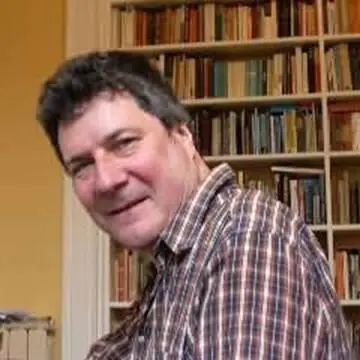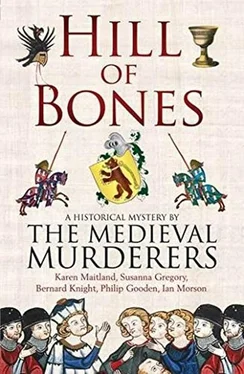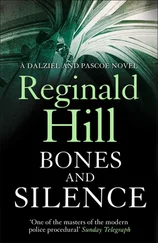‘The problem is that the abbey went downhill in a big way after those dates. It fell into ruin and most of the records were lost. I’m afraid the present abbey doesn’t have much hope of claiming them back.’
‘What about the mummy? How long do you reckon that’s been up here?’
‘That’s bizarre, isn’t it? An Egyptian mummy on top of a Somerset hill!’ Shirley put her empty tin on the table. ‘About two hundred years ago, possessing a mummy was a fad amongst the idle rich, so perhaps it was hidden around that time. That forensic anthropology lady did a good job in spotting what it was – the embalming had allowed some bits of skin to survive on the bones.’
She stood up and took her tin over to a waste bin. ‘I’d better get back, I suppose. There’s nothing new to examine, but maybe I can stop Tweedledum and Tweedledee from coming to blows.’
The two detectives rose as well.
‘We were going over there anyway, so we’ll come with you,’ said Bolitho. ‘I’d better tell them that I’m recommending to Headquarters that we wrap up this operation tomorrow.’
They ambled across the enclosure towards the tent, sensing that a lethargy had descended on the remaining scrapers and sievers, who had slowed down their efforts in the knowledge that the search was virtually at an end. Inside the stifling warmth of the exhibits store, they found Peter Fortescue glaring into his laptop on the desk table, baseball cap still firmly on his head. His more eccentric colleague was in the aisle between the tables, his lips moving silently as he checked the identifying labels tied to the items on display. For once, there was peace and quiet, as the two men appeared to be ignoring each other.
Bob Bryant walked over to Humbolt, who had picked up a blackened object. ‘Any more ideas on what that might be, Doctor?’ he asked. He was not that interested, but felt he should be civil to the man.
‘It’s part of a hand mirror, of course,’ grunted the expert. ‘Badly damaged and seems to have been in a fire as well. Not surprising, as it was recovered from a pile of ashes.’
‘Are those some kind of jewels on the back?’
‘Yes, but I doubt they have much value now. Most are missing and the couple that are left are cracked and scorched. The mirror itself is silver and what remains of the enamel on the back suggests it was a costly piece. It needs a real specialist to evaluate it, but I suspect it must be very old.’
‘Perhaps it belonged to Queen Guinevere!’ called Fortescue from his place at the desk. The provocative remark triggered a furious response from Roger Humbolt.
‘Mock as much you want, you moron!’ he shouted. ‘When I’m proved right about Badon, you’ll have to eat your words.’
He snatched up another object from a table, a dented piece of rusted metal with no obvious shape, as far as the police officers could tell.
‘This is part of a helmet; it could have been Saxon or Celtic. It all adds to the burden of proof that there was a battle on this hill!’
Fortescue rose from his chair and sauntered over to where the others were standing.
‘With so little left, it could be from any period! Probably late medieval, could even be Tudor.’
Humbolt thrust his face towards his antagonist, his features now almost as red as his hair. ‘Nonsense, it’s much earlier than that!’ Then he swung round to the other row of tables and jabbed a finger at the pile of darkened, crumbling bones. ‘Look at this lot! Obvious battle casualties! On that skeleton over there, the pathologist pointed out a clear knife-cut on a rib and the edge of the breastbone.’
Fortescue’s reply was scathing. ‘One swallow doesn’t make a summer and one stab wound doesn’t make a battle! Where are all the victims from your Badon, eh? Arthur is supposed to have slain nine hundred himself!’
The other man was now almost purple with rage. ‘You know damned well that wasn’t meant literally! And if we could dig up the whole hill, there’d be hundreds more like this, even after fifteen centuries!’
Shirley Wagstaff tried to cool the argument, but Humbolt was now in full flow. He snatched up another find from the first table and held it up in a shaking hand. ‘And what about this! A knife that I’d stake my life came from the Dark Ages.’
Bolitho felt he should say something to cool their passions. ‘Wouldn’t that blade have more rust on it after all that time?’
The older archeologist glared at the detective with his bulging eyes. ‘You obviously know little about it, Officer. There were smiths in those days who could make rustless iron, like the Pillars of Delhi and Dhar!’
‘Come off it, Roger, they were in India, not Celtic Britain!’ countered Fortescue, derisively.
In angry response, Humbolt jabbed his other forefinger at the handle. ‘Look at that carving, will you? Do you deny that is a bear carved in ivory, the symbol of Arthur the Great Bear?’
‘Plenty of performing bears around until well past Shakespeare’s time, chum!’ sneered Fortescue. ‘And where the hell would they get ivory from in the fifth century?’
‘You ignoramus!’ shrieked the red-headed disciple of the Once and Future King. ‘I know this knife must have belonged to Arthur himself. I feel it in my very soul!’
Before the astounded policemen could stop him, Roger Humbolt had plunged the blade into the chest of the man who had been baiting him.
Bolitho and Bryant watched while the helicopter took off and whirred its way towards Frenchay Hospital, Shirley Wagstaff being on board to comfort Peter Fortescue.
‘The paramedic seemed happy enough about him,’ observed the superintendent. ‘He said that little knife didn’t damage any organs, but caused a pneumothorax, whatever that it is.’
‘He’s not going to snuff it, thank God,’ said Bryant. ‘Are we going to charge the mad fellow with attempted murder or just GBH? I suppose the CPS will choose the easiest option, as usual.’
Bolitho shrugged as they started to walk back to the tent, which was now a crime scene, though the miscreant was still sitting crying in the picnic chair, guarded by the PC from the door.
‘Ironic, really!’ said the superintendent. ‘We come up trying to sort out a murder and almost end up with a totally different one. That bloody Arthur has a lot to answer for; he’s been causing trouble for the past fifteen hundred years!’
His assistant agreed. ‘Solsbury Hill, indeed! Damned place must be cursed!’
A small group of historical mystery writers, all members of the Crime Writers’ Association, who promote their work by giving informal talks and discussions at libraries, bookshops and literary festivals.

Bernard Knightis a former Home Office pathologist and professor of forensic medicine who has been publishing novels, non-fiction, radio and television drama and documentaries for more than forty years. He writes the highly regarded Crowner John series of historical mysteries, based on the first coroner for Devon in the twelfth century.

Ian Morsonis the author of an acclaimed series of historical mysteries featuring the thirteenth-century Oxford-based detective, William Falconer, and a brand-new series featuring Venetian crime solver, Nick Zuliani.

Philip Goodenis the author of the Nick Revill series, a sequence of historical mysteries set in Elizabethan and Jacobean London, during the time of Shakespeare’s Globe Theatre. The latest titles are Sleep of Death and Death of Kings. He also writes 19th century mysteries, most recently The Durham Deception , as well as non-fiction books on language . Philip was chairman of the Crime Writers’ Association in 2007-8.
Читать дальше















